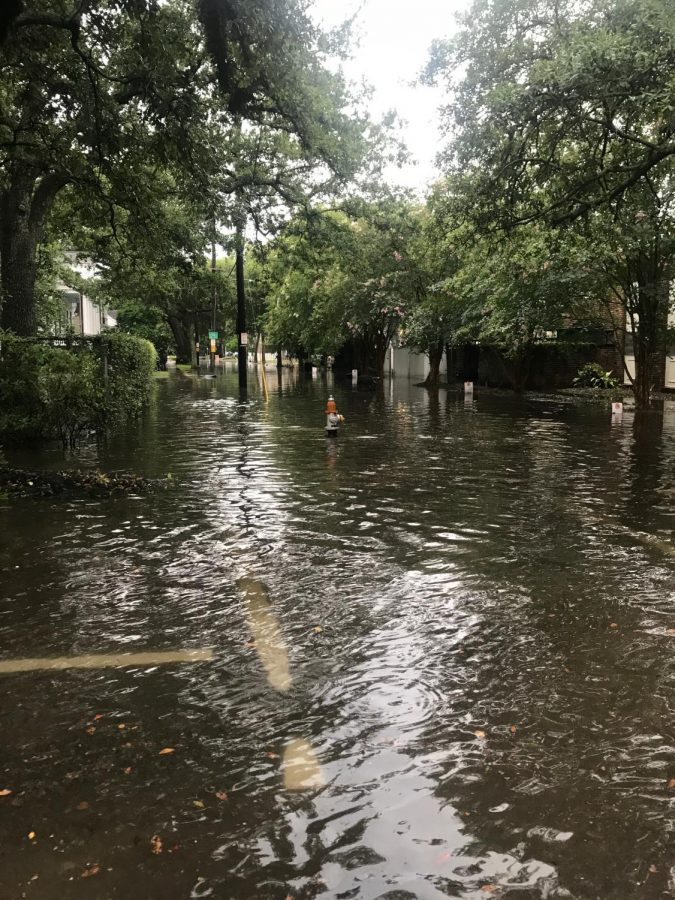Tulane must seriously prepare for the climate crisis
Elana Bush | Photography Editor
Students strike in support of fossil fuel divestment at Tulane in September.
January 23, 2020
In 2015, Tulane adopted its climate action plan, promising to undergo major structural changes to reduce its greenhouse emissions. The ultimate goal of the plan was to achieve carbon neutrality by 2050, certainly a worthy objective, despite some criticisms of lack of follow through from students. For those looking toward the future of climate change and its effects on a city like New Orleans, however, it raises a morbid question: Will there be a Tulane to be carbon neutral in 2050?
Tulane is no stranger to the devastating ramifications weather can have, but climate change has ensured that what is on its way is something that no one can predict or anticipate. Rising sea levels and ocean temperatures, symptoms of climate change, increase the intensity of hurricanes and the damage they wreak. Hurricanes and subsequent flooding have proven themselves to be deeply damaging to Tulane’s campus, and significantly more so to New Orleans as a whole. This will only get worse as the effects of climate change increase.
Just this summer, Hurricane Barry exposed some of the holes in Tulane’s apparent plan to address climate disasters as they happen. Despite the storm almost completely missing New Orleans, it shut down the city for several days and caused some to evacuate. Tulane was affected as well.
Due to pump failure, the apartments of many off campus students were flooded, and a massive oak tree outside Gibson was uprooted. The campus was closed for multiple days, and classes were cancelled. During the school year, these events would have been an even greater interruption for students, and this was a storm that didn’t even hit the city. Tulane can’t stop the oncoming storms, but it will have to decide how to deal with what will become even more frequent and dangerous disruptions.
Tulane is uniquely positioned in New Orleans to stay dry while other areas flood more heavily, as was apparent during Hurricane Katrina. Even if by some miracle Tulane went unaffected by the inevitable storms, flooding, sea level rise, and crumbling infrastructure in the city would surely have a major effect. According to predictive maps, a six-foot sea level rise, a near certainty by 2050, will cover the majority of the city in water. Even if Tulane isn’t part of that majority, it cannot survive as an island.
Yet the Tulane administration seems unconcerned with the future of campus as they continue to build, with continued investment in construction projects. Bruff Commons, which was closed last year to be replaced by a new shiny new dining hall worth $55 million, stood for almost 60 years. Though the new Commons is raised in order to reflect post-Hurricane Katrina times, there is little likelihood that it will stand another 60 years without storm damage. The same can be said about Yulman Stadium, which was added only six years ago and cost $73 million. The construction, despite some efforts at sustainability, raises more questions about the perceived future of Tulane than it answers.
Additionally, even if Tulane is able to stay afloat in the coming years, it also must significantly reevaluate its role in New Orleans. The university has heard a great deal of criticism throughout its time for contributing to the gentrification of New Orleans. This will only increase in the wake of climate-related damage.
Regardless of potential harm suffered by Tulane’s campus, harm suffered by less wealthy parts of the city will undoubtedly be worse. Will Tulane capitalize on the displacement of poorer residents, as “climate gentrifiers” across the country have already been doing? Will it abandon the city that has been its home for almost 200 years, leave many out of a job? Tulane has depended on the labor, environment, and support of New Orleans and its people for its entire history, and it has a moral responsibility to them in its decisions moving forward.
Tulane’s climate action plan is admirable, but it fails to address Tulane’s unique position in the climate crisis, one of both vulnerability and privilege. Tulane lacks transparency regarding their long-term plan when it comes to the undeniable effects climate change will bring on this campus and the city around it. It needs to consider, deeply and openly, its answers to the huge questions surrounding its future.
























senior • Jan 27, 2020 at 5:20 pm
great article!! was waiting for the conversation on this to be brought more to light.